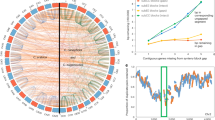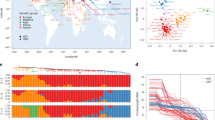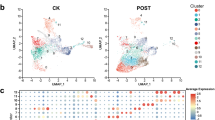Abstract
ATTEMPTS to solve the problem of the 'bolter' condition in domestic potato varieties have appeared from time to time in these columns. Thomas1, for example, demonstrated that bolters differ from normal plants by the presence of a small supernumerary chromosome, though Carson and Howard2 have found no differences between 'bolter' and normal in this respect. They showed, however, that the 'bolter' condition could be transmitted to its progeny when crossed with normal plants.
This is a preview of subscription content, access via your institution
Access options
Subscribe to this journal
Receive 51 print issues and online access
$199.00 per year
only $3.90 per issue
Buy this article
- Purchase on Springer Link
- Instant access to full article PDF
Prices may be subject to local taxes which are calculated during checkout
Similar content being viewed by others
References
Thomas, P. T., Nature, 155, 242 (1945).
Carson, G. P., and Howard, H. W., Nature, 154, 829 (1944).
Driver, C. M., and Hawkes, J. G., Imperial Bureau of Plant Breeding and Genetics (Cambridge, 1943).
Author information
Authors and Affiliations
Rights and permissions
About this article
Cite this article
HAWKES, J. Potato 'Bolters': an Explanation Based on Photoperiodism. Nature 157, 375–376 (1946). https://doi.org/10.1038/157375c0
Issue Date:
DOI: https://doi.org/10.1038/157375c0
This article is cited by
-
Norgold Russet and Norgold Russet strain M — additional evidence for genetic dissimilarity
American Potato Journal (1995)
-
Sangre selection studies: I. Selection and comparative trials
American Potato Journal (1988)
-
Regarding the novelty and breeding value of protoplast-derived variants of Russet Burbank (Solanum tuberosum L.)
Euphytica (1984)
-
A comparison of five clones of virus-free Netted Gem potato from British Columbia and Idaho
American Potato Journal (1976)
-
Cytogenetic studies on Solanum tuberosum L. and some of its relatives
Genetica (1951)
Comments
By submitting a comment you agree to abide by our Terms and Community Guidelines. If you find something abusive or that does not comply with our terms or guidelines please flag it as inappropriate.



